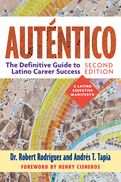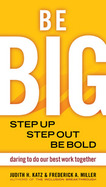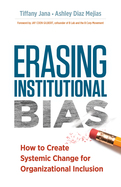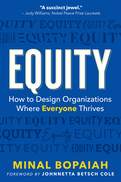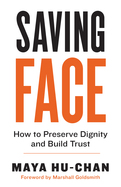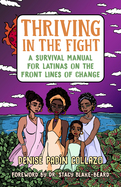Search Results: "how to be an inclusive leader"
Results 13-18 of 663
America has an urgent need for Latino and Latina executives. This book identifies a path to uplift and amplify their representation in leadership.
Latinos and Latinas will account for a third of our workforce by 2050-yet they make up only 5 percent of senior roles in corporate America. Dr. Robert Rodriguez and Andrés T. Tapia call this low percentage of Latino and Latina corporate executives today the “5 percent Shame.”
Inspired by Price M. Cobbs's seminal work on the secrets of successful Black leaders, this book seeks to understand the impact on Latinos and Latinas of the external forces of conscious and unconscious biases and of the internal forces of whether to assimilate or double down on their cultural identities in their quest to get ahead.
The second edition features a new foreword by Henry Cisneros, former secretary of the Department of Housing and Urban Development, as well as updated statistics and graphs to represent how America's career landscape for Latinos has and has not changed and how to ensure Latinos can rise to their fullest potential.
Using insights from in-depth interviews with twenty highly successful boomer Latino and Latina executives and focus groups with dozens of Gen X and millennial leaders, the authors have captured lessons about how these individuals chose their career paths, addressed challenges, and seized opportunities. The discussions are interpreted through the lenses of the authors' different personal experiences as Latino leaders in corporate America and synthesized as a guide for future leaders.
Latinos and Latinas will account for a third of our workforce by 2050-yet they make up only 5 percent of senior roles in corporate America. Dr. Robert Rodriguez and Andrés T. Tapia call this low percentage of Latino and Latina corporate executives today the “5 percent Shame.”
Inspired by Price M. Cobbs's seminal work on the secrets of successful Black leaders, this book seeks to understand the impact on Latinos and Latinas of the external forces of conscious and unconscious biases and of the internal forces of whether to assimilate or double down on their cultural identities in their quest to get ahead.
The second edition features a new foreword by Henry Cisneros, former secretary of the Department of Housing and Urban Development, as well as updated statistics and graphs to represent how America's career landscape for Latinos has and has not changed and how to ensure Latinos can rise to their fullest potential.
Using insights from in-depth interviews with twenty highly successful boomer Latino and Latina executives and focus groups with dozens of Gen X and millennial leaders, the authors have captured lessons about how these individuals chose their career paths, addressed challenges, and seized opportunities. The discussions are interpreted through the lenses of the authors' different personal experiences as Latino leaders in corporate America and synthesized as a guide for future leaders.
Be BIG
2008
From diversity experts Judith Katz and Frederick Miller comes an illustrated guide to being your full-sized self in a very large workplace-world, Be BIG.
Too many people have decided that the safest way to get through life is to be small. They try not to attract attention to themselves, just tending their own safe little garden. They've decided it's too dangerous to think big, to speak out, to take risks. They might get shot down. Or look foolish. People will think they're just not good enough.
But, particularly today, organizations need people to step up and be BIG. We need new ideas, new products, new processes. People have to bring more of themselves to the workplace, to contribute more, and to have a bigger impact on the success of the organization.
This inspiring illustrated book challenges all of us to show up more fully as individuals and in our interactions with others and to find ways to be BIG together. In straightforward, incisive language, Judith Katz and Frederick Miller help us understand all of the many, sometimes subtle ways we make ourselves small. They show how we make others small as well and how these same attitudes can keep us from working together effectively. And they encourage us to nourish new attitudes that will make us, our coworkers, and our organizations bigger.
Be BIG invites us to bring more of ourselves to each situation—whether working independently, with another individual, or with a group—so that we can do our best work together.
Too many people have decided that the safest way to get through life is to be small. They try not to attract attention to themselves, just tending their own safe little garden. They've decided it's too dangerous to think big, to speak out, to take risks. They might get shot down. Or look foolish. People will think they're just not good enough.
But, particularly today, organizations need people to step up and be BIG. We need new ideas, new products, new processes. People have to bring more of themselves to the workplace, to contribute more, and to have a bigger impact on the success of the organization.
This inspiring illustrated book challenges all of us to show up more fully as individuals and in our interactions with others and to find ways to be BIG together. In straightforward, incisive language, Judith Katz and Frederick Miller help us understand all of the many, sometimes subtle ways we make ourselves small. They show how we make others small as well and how these same attitudes can keep us from working together effectively. And they encourage us to nourish new attitudes that will make us, our coworkers, and our organizations bigger.
Be BIG invites us to bring more of ourselves to each situation—whether working independently, with another individual, or with a group—so that we can do our best work together.
All humans have bias, and as a result, so do the institutions we build. Internationally sought after diversity consultant Tiffany Jana offers concrete ways for anyone to work against institutional bias no matter what their position is in an organization.
Building upon the revelatory power of her book Overcoming Bias, which addressed managing individual and interpersonal bias, Erasing Institutional Bias scales up the framework to impact systemic change in organizations. Jana and coauthor Ashley Diaz Mejias bring together in-depth research on how biases become embedded into workplace cultures with practical and engaging tools that will mobilize readers toward action. They confront specific topics such as racism, sexism, hiring and advancement bias and retribution bias, meaning when organizations develop a culture of aggression, and offer solutions for identifying and controlling them.
This book urges readers to ask questions such as, “Are we attempting to create systems in which all people can thrive? What kind of world and what kind of workplaces are we cultivating?” These questions, the authors say, must first be answered by ourselves, recognizing our own role in perpetuating harmful biases that come to define institutions.
In a world divided, Erasing Institutional Bias is designed to raise awareness about imbalances and help us hold ourselves accountable for creating a world that works for everyone. Each of us can evaluate our own current role in perpetuating systemic bias and define our new role in breaking it down. Jana and Mejias inspire and equip us so that we can all affect organizational change, together.
Building upon the revelatory power of her book Overcoming Bias, which addressed managing individual and interpersonal bias, Erasing Institutional Bias scales up the framework to impact systemic change in organizations. Jana and coauthor Ashley Diaz Mejias bring together in-depth research on how biases become embedded into workplace cultures with practical and engaging tools that will mobilize readers toward action. They confront specific topics such as racism, sexism, hiring and advancement bias and retribution bias, meaning when organizations develop a culture of aggression, and offer solutions for identifying and controlling them.
This book urges readers to ask questions such as, “Are we attempting to create systems in which all people can thrive? What kind of world and what kind of workplaces are we cultivating?” These questions, the authors say, must first be answered by ourselves, recognizing our own role in perpetuating harmful biases that come to define institutions.
In a world divided, Erasing Institutional Bias is designed to raise awareness about imbalances and help us hold ourselves accountable for creating a world that works for everyone. Each of us can evaluate our own current role in perpetuating systemic bias and define our new role in breaking it down. Jana and Mejias inspire and equip us so that we can all affect organizational change, together.
Equity
2021
A fast and engaging read, Equity helps leaders create more inclusive organizations using human-centered design and behavior change principles.
Even the most passionate advocates for diversity, equity, and inclusion have been known to treat equity as the middle child—the concept they skip over to get to the warm, fuzzy feelings of inclusion. But Minal Bopaiah shows throughout this book that equity is critical if organizations really want to leverage differences for greater impact.
Equity allows leaders to create organizations where employees can contribute their unique strengths and collaborate better with peers. Bopaiah explains how leaders can effectively raise awareness of systemic bias and craft new policies that lead to better outcomes and lasting behavioral changes. This book is rich in real-world examples, such as managing partners at a consulting firm who learn to retell their personal stories of success by crediting their systemic advantages and news managers at NPR who redesign their processes to support greater diversity among news sources. This slender book expands DEI past human resources initiatives and shows how leaders can embed equity into core business functions like marketing and communications.
Filled with humor, heart, and pragmatism, Equity is a guidebook for change, answering the question of how that so many leaders are asking today.
Even the most passionate advocates for diversity, equity, and inclusion have been known to treat equity as the middle child—the concept they skip over to get to the warm, fuzzy feelings of inclusion. But Minal Bopaiah shows throughout this book that equity is critical if organizations really want to leverage differences for greater impact.
Equity allows leaders to create organizations where employees can contribute their unique strengths and collaborate better with peers. Bopaiah explains how leaders can effectively raise awareness of systemic bias and craft new policies that lead to better outcomes and lasting behavioral changes. This book is rich in real-world examples, such as managing partners at a consulting firm who learn to retell their personal stories of success by crediting their systemic advantages and news managers at NPR who redesign their processes to support greater diversity among news sources. This slender book expands DEI past human resources initiatives and shows how leaders can embed equity into core business functions like marketing and communications.
Filled with humor, heart, and pragmatism, Equity is a guidebook for change, answering the question of how that so many leaders are asking today.
Saving Face
2020
“Maya Hu-Chan shares a blueprint for becoming a more empathetic, self-aware, and inclusive leader. Saving Face guides us to consider different perspectives, to think first and speak last, and to respect others above all else.”
—Frances Hesselbein, former CEO, Girl Scouts of the USA, and Presidential Medal of Freedom recipient
Organizations now need to attract, retain, and motivate teams and employees across distance, time zones, and cultural differences. Building authentic and lasting human relations may be the most important calling for leaders in this century. According to management and global leadership specialist Maya Hu-Chan, the concept of “saving face” can help any leader preserve dignity and create more empathetic cross-cultural relationships.
“Face” represents one's self-esteem, self-worth, identity, reputation, status, pride, and dignity. Saving face is often understood as saving someone from embarrassment, but it's also about developing an understanding of the background and motivations of others to discover the unique facets we all possess. Without that understanding, we risk causing others to lose face without even knowing it. Hu-Chan explains saving face through anecdotes and practical tools, such as her BUILD leadership model (Benevolence, Understanding, Interacting, Learning, and Delivery). This book illustrates how we can give face to create positive first impressions, avoid causing others to lose face, and, most importantly, build trust and lasting relationships inside and outside the workplace.
—Frances Hesselbein, former CEO, Girl Scouts of the USA, and Presidential Medal of Freedom recipient
Organizations now need to attract, retain, and motivate teams and employees across distance, time zones, and cultural differences. Building authentic and lasting human relations may be the most important calling for leaders in this century. According to management and global leadership specialist Maya Hu-Chan, the concept of “saving face” can help any leader preserve dignity and create more empathetic cross-cultural relationships.
“Face” represents one's self-esteem, self-worth, identity, reputation, status, pride, and dignity. Saving face is often understood as saving someone from embarrassment, but it's also about developing an understanding of the background and motivations of others to discover the unique facets we all possess. Without that understanding, we risk causing others to lose face without even knowing it. Hu-Chan explains saving face through anecdotes and practical tools, such as her BUILD leadership model (Benevolence, Understanding, Interacting, Learning, and Delivery). This book illustrates how we can give face to create positive first impressions, avoid causing others to lose face, and, most importantly, build trust and lasting relationships inside and outside the workplace.
Social justice work is more crucial than ever, but it can be physically and emotionally draining. Longtime activist Denise Collazo offers three keys to help Hispanic women keep their focus, morale, and energy high.
Winner of the gold medal at the International Latino Book Awards for Best Latina-Themed Book and Best Self-Transformational Book!
Doing the work of social change is hard. Waking up every day to take on the biggest challenges of our time can be overwhelming, and sometimes progress is hard to see. She understands that Latina and all women of color activists do their best work when they are thriving, not simply surviving.
Denise Padín Collazo has been there. She is the first Latina, the first woman of color, and the first woman period to raise a family and stay in the work of community organizing at Faith in Action, an international progressive network of 3,000 congregations and 2 million members. Drawing on her own experiences of triumph and failure, and those of other Latina activists, Collazo lays out three keys to thriving in the movement for social change: leading into your vision, living into the fullest version of yourself, and loving past negatives that hold you back. She also warns about the three signs that you may be surrendering: wishing for a future reality to emerge, wondering where your limits are, and waiting for permission and answers to come from others.
Using this framework, Collazo offers wise and compassionate advice on some of the most important leadership challenges facing Latina activists. She explains how you can integrate family and work, step out of the background and claim your leadership potential, confront anti-Blackness in your own culture, keep focused on your ultimate purpose, and raise the necessary resources to keep fighting for justice. This honest, practical, and inspirational book will help Latina activists to burn bright, not burn out.
Winner of the gold medal at the International Latino Book Awards for Best Latina-Themed Book and Best Self-Transformational Book!
Doing the work of social change is hard. Waking up every day to take on the biggest challenges of our time can be overwhelming, and sometimes progress is hard to see. She understands that Latina and all women of color activists do their best work when they are thriving, not simply surviving.
Denise Padín Collazo has been there. She is the first Latina, the first woman of color, and the first woman period to raise a family and stay in the work of community organizing at Faith in Action, an international progressive network of 3,000 congregations and 2 million members. Drawing on her own experiences of triumph and failure, and those of other Latina activists, Collazo lays out three keys to thriving in the movement for social change: leading into your vision, living into the fullest version of yourself, and loving past negatives that hold you back. She also warns about the three signs that you may be surrendering: wishing for a future reality to emerge, wondering where your limits are, and waiting for permission and answers to come from others.
Using this framework, Collazo offers wise and compassionate advice on some of the most important leadership challenges facing Latina activists. She explains how you can integrate family and work, step out of the background and claim your leadership potential, confront anti-Blackness in your own culture, keep focused on your ultimate purpose, and raise the necessary resources to keep fighting for justice. This honest, practical, and inspirational book will help Latina activists to burn bright, not burn out.


